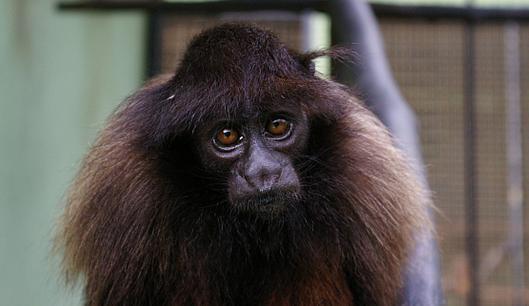Bruna Martins Bezerra
Other projects
26 Jul 2010
In Situ Conservation of the Blond Capuchin, Cebus flavius, in Fragments of Atlantic Rain Forest in the Northeast of Brazil
8 Sep 2017
In Situ Conservation of the Blonde Capuchins: Predicting Potential Responses to Future Climate and Anthropogenic Disturbances
3 Mar 2022
Blonde Capuchin Research Conservation Project: Understanding Conservation Needs by Creating an Interface Between Research and Society
The vocal repertoire of wild golden-backed uacari, Cacajao melanocephalus ouakary, will be ascertained and related to their behaviour in order to gain a greater understanding of their social ecology.

Golden-backed uakari (Cacajao melanocephalus). ©Bruna Bezerra.
I am studying the social ecology of a rare monkey, the golden-backed uacari, Cacajao melanocephalus ouakary, in the one of the most difficult and challenging of South America´s many habitats, the blackwater swamp forests of the upper Amazon, the Igapó forest. The golden-backed uacari is endemic to Igapó forest and little is known about the biology of this species (Barnett & Brandon-Jones, 1997). This species is probably vulnerable due to hunting and its use of igapó has meant its numbers have been overestimated (Defler 2005). The study is part of an integrated 18-month fieldwork project that is investigating the ecology of the uacaris, as well as the other primates and the parrots that live in National Park of Jaú (PNJ) in Amazon, Brazil.
The study is a part of the on-going management plan of the PNJ. Only preliminary investigations of diet and habitat choice have been conducted for the golden-backed uacari (Defler 2001; Barnett et al 2002; Barnett et al 2005), with no field studies at all conducted on the social ecology of either this sub-species or C. m. melanocephalus. The PNJ has 12% of its area represented by Igapó forest (FVA, 1998; Borges et al., 2004). The project will bring-in new information on the behaviour, sociality and ecology of golden-backed uacari, which will be used for the plan of conservation of this rare primate species. Since my project focuses mainly on the vocal communication of the golden-backed uacari, it will also add to of understanding of communication in non-human primates, and may lead to a valuable method for surveying these rare monkeys from their vocalisations, in a habitat where visual surveys would be difficult. In addition, the project is also benefiting the local human population, since the natives of the area are used as field guides.